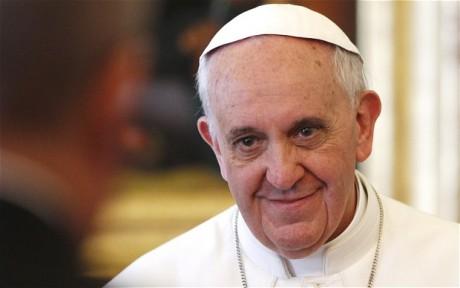Pope Francis, the Poster Boy for Today's Catholics
By Cristina Odone
[with audio] When I read about the new Judi Dench film Philomena, my heart sank. Here was another tear-jerker which, like the earlier The Magdalene Sisters, exposed the abuse that unwed mothers suffered at the hands of the Catholic nuns who took them in. The image of the Church as a misogynist institution would have such a firm hold on the public’s imagination, no one would point out that many selfless and inspiring nuns were risking their lives in Latin America or Africa; no one would pay tribute to the teaching orders that had schooled millions of girls from the poorest families, filling them with ambition and the self-confidence to achieve it. As the film premiered, I donned a tin hat and prepared myself for an open season on “cruel” Catholics. Except that it didn’t come. In its place, I have witnessed a dizzying, breathless love-fest. Its object, miraculously, is the new head of the Catholic Church, Pope Francis. Francis-mania has swept Catholic countries such as Italy, where churches are filling, and his native Argentina, where his name, Francisco, is now the most popular for newborn boys. Part of the Pope’s extraordinary popularity is down to his charm. From the moment he stood on the balcony in St Peter’s Square, cracking a joke and inviting his audience around the world to go with him on a journey, Francis has appeared humble, warm-hearted, and inclusive: simpatico, as Italians would say. He has opted for a modest lifestyle – living in a hostel, driving a second-hand Peugeot, dispensing with bodyguards – which confirms that as far as he is concerned, “we are all in this together”. But the Pope is not just a new take on Don Camillo – the folksy village priest in the entertaining post-war novels. Francis’s attacks on waste, greed and xenophobia have had traditional critics of the Church, such as The Guardian, hailing him as an icon for the Left. His interventions on peace in Syria and the plight of immigrants in Lampedusa have led the diplomatic magazine Foreign Policy to call his the most impressive voice in the international arena. Within the great tent of the Catholic Church, those of us who have fallen foul of rules forbidding homosexual relationships, or the remarriage of divorcees, are waiting with bated breath. Francis promotes inclusion: do we dare hope he means us, too? Rules are rules, but the Pope seems to place everything in its human context. Love trumps everything. He recently sent a survey to all the Church’s parishioners to see how we lived out its doctrine: how many of us don’t practise birth control, or won’t have sex before marriage? The answers might not be what the Church wants to hear – but I suspect he knows this. It’s too early to predict whether students from Berkeley through Bristol to Brisbane will replace posters of Che Guevara in his beret with the Pope in his white skullcap. Too early to say whether Francis I is at the helm of a “Vatican spring” that will revolutionise the curia. Already, though, I am so grateful to him for making “Catholic” a word that does not automatically conjure up thoughts of homophobia, sexism and paedophilia. Suddenly, being a Catholic feels good. Friends who have never set foot in a church recognise that there is someone on my side of the fence who challenges the senseless pursuit of money, celebrity and youthful looks. They no longer sneer when I mention my faith. Francis as spiritual leader crosses national boundaries in the way the Dalai Lama has done – but where the Tibetan leader represents a tiny group, the Pope speaks for a billion Catholics, and, it would now seem, for millions more. I’m no longer wary of films like Philomena. I might even buy a ticket. Not even Judi Dench can dent the Francis Effect.
|
.
Any original material on these pages is copyright © BishopAccountability.org 2004. Reproduce freely with attribution.
